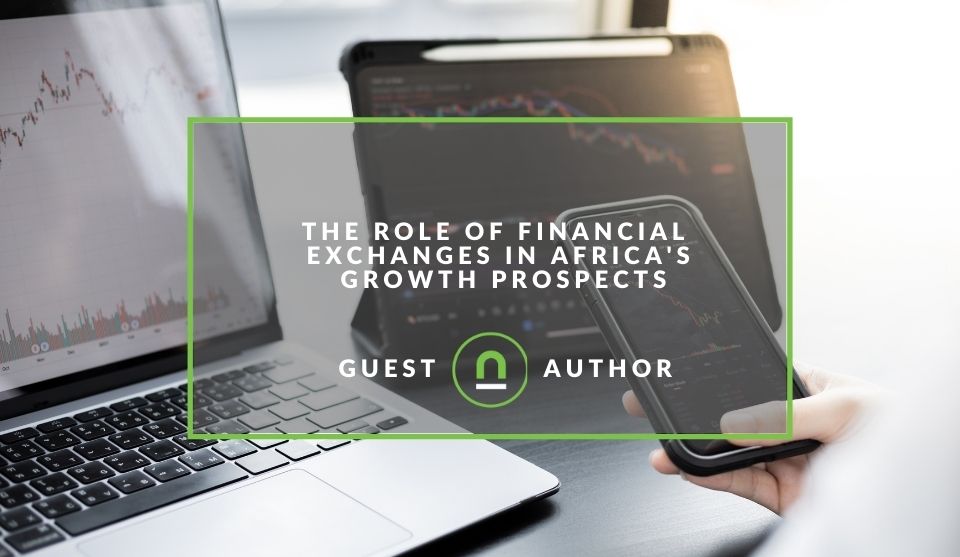Recent posts

The Great Outdoors
The Genetic Diversity Of Cannabis Seeds In South Africa
18 June 2025

Money Talks
Taking Out A Loan To Cover Urgent Expenses
17 June 2025

Money Talks
How To Choose the Right Payday Loan
16 June 2025

Temping
Why AI Won't Replace Graphic Designers
15 June 2025
Popular posts
Extravaganza
Trending Music Hashtags To Get Your Posts Noticed
24 August 2018
Geek Chic
How To Fix iPhone/iPad Only Charging In Certain Positions
05 July 2020
Extravaganza
Trending Wedding Hashtags To Get Your Posts Noticed
18 September 2018
Money Talks
How To Find Coupons & Vouchers Online In South Africa
28 March 2019
The Role Of Financial Exchanges In Africa's Growth Prospects
20 August 2021 | 0 comments | Posted by Natalia Revishvili in Money Talks
African stock exchanges can play a vital role in the future economic development and growth of the whole region. Over the past few decades, the improved political stability in the region has created a great environment for African exchanges.
Thanks to these exchanges, the newer generation of the region, the majority of which are very interested in the financial markets, can easily create their portfolios. While there still are many challenges and difficulties present, investors in the region are becoming more and more invested in the trading markets.
Over the past few years, numerous industries saw a huge growth in Africa, one of them was the banking sector, which has become a lot more consumer-focused.
The further development of the financial markets is very important for the region. In general, a safe and secure trading market means that the population is able to generate additional income, which can be very helpful for Africans.
As the investment market is still at its developing stages in the region, there are many things that you should consider as an African stock investor. This includes deciding which assets to invest in, how to get started in the investment world, stock trading commissions with different brokerages and exchanges, what to focus on while investing, and numerous other factors.
However, as the markets continue to develop, newcomers find it easier to get started in the trading market. Also, the opportunities are increasing as well.
What changed in recent years?
While not many people know, over the past few decades, business, economic, and IT sectors have seen a huge growth in the region. In fact, there are quite a few successes achieved in these fields and industries in the region.
For example, Mauritius is on its way to becoming Africa's first high-income economy, and it is not alone; there are many other countries in the region working actively to achieve the same level of success. In total, there are 27 national security exchanges in the region and three regional exchanges. The largest exchange in terms of market capitalization is the Johannesburg Securities Exchange, JSE, located in South Africa.
Because there are so many exchanges in the region, it is very easy for local traders to start investing. The number of African investors has increased a lot over the past few years.
They are using different types of strategies to earn profits from the market; while some invest long-term, others are looking for quick turnovers. For instance, a one-minute strategy for stock trading is used very frequently by local traders to generate fast profits.
The interest around investing in the African exchanges is huge both among local as well as international investors. However, today's laws and regulations make it very hard for international investors to put their money in local exchanges.
Recently, as many as 44 countries in the region entered the African Continental Free Trade Area and Peace and Security Agreement. However, there still is not an agreement that would make Africa a free investment zone.
If necessary legislation and laws are adopted, the investment in the region will have the opportunity to increase drastically. As there already is a huge interest from the international players, the only thing left to do is for the region to react accordingly.
Problems associated with liquidity.
Among many challenges that the local exchange market is facing in Africa is the lack of liquidity. There are many things that cause this situation in the region, some of them being lack of diversification, high trading fees, and wrong pricing of the markets. Also, because there are a considerably smaller number of companies listed on the exchanges, investors do not really have much choice.
But, this kind of problem can be easily overcome. For example, governments and exchanges can cooperate to come up with new strategies to change the current situation.
A well-developed, detailed regulatory guideline and actual legislation that answers the challenges raised could be a great help. This way, the market in the region could be more stable, which can be a huge help for the further development of the field.
Another very important obstacle to overcome is the fact that there is a serious lack of knowledge among the population in the region about the exchanges and the opportunities that these exchanges can bring to regular people.
While exchanges can help further the development of the local economy and it can actually work as a tool for closing the gap in income inequality, it is very important to give enough knowledge about the trading markets to locals.
One way to make the local investing market more liquid is to increase the listings on the local exchanges. Although the number of exchanges has grown a lot, most of them do not offer that many listed companies, which can be quite a challenge.
At the end of the day, there is a huge value that the African exchanges can offer to local investors in the country. While the financial markets are becoming more popular and a lot easier to access among local investors, there still are many things left to do.
The African economy faces unique challenges.
The challenges are a lot, and overcoming them will not be easy. However, Africa is one of those regions that had managed to find a way out of many obstacles, and the current problems associated with the trading markets in the country are every likely to be resolved in the upcoming decades.
As for the exchanges, they can be very helpful for the future development of the economy in the region. This can be used by locals as a way to increase their income, which can help to make the income gap between locals in the region a lot.
Tell us your story
Would you like to write for nichemarket just like Natalia has? Find out how to submit a guest post, and when you're ready, you can contact us.
Do you seek financial help?
Find a financial advisor or financial consultant in your area
Get started with nichemarket
If you are a financial adviser and would like more leads then why not list your business with nichemarket. Registering with nichemarket is easy; all you will need to do is head over to our sign up form and follow the instructions. If you require a more detailed guide on how to create your profile or your listing, then we highly recommend you check out the following articles.
Recommended reading
If you enjoyed this post and have the time to spend diving deeper down the rabbit hole, then we suggest you check out the following posts about improving your finances in South Africa.
- How South Africans Can Save Money Each Month
- The Pros and Cons Of Tap and Go Cards
- What Is A Money Market Account?
- Ways To Earn Cryptocurrency
- How To Passively Earn Cryptocurrency
- Types Of Cryptocurrency Exchanges
- How South Africans Can Buy Bitcoin
- How To Use Options To Profit From Black Swan Events
Disclaimer: This is not investment advice and is for informational purposes only. nichemarket cannot be held liable for any investment decisions made based on the information given by independent financial service providers. Under the ECT Act and to the fullest extent possible under the applicable law, nichemarket disclaims all responsibility or liability for any damages whatsoever resulting from the use of this site in any manner.
You might also like
Why AI Won't Replace Graphic Designers
15 June 2025
Posted by Che Kohler in Temping
AI has been seen as a threat to many tech and knowledge jobs, but we tend to discount the human advantage in the age of automation and DIY designers
Read moreTaking Out A Loan To Cover Urgent Expenses
17 June 2025
Posted by Ava Castle in Money Talks
As the cost of living increases across the United Kingdom, we look at how you can use loans to cover shortfalls or unexpected expenses that savings c...
Read more{{comment.sUserName}}
{{comment.iDayLastEdit}} day ago
{{comment.iDayLastEdit}} days ago
 {{blogcategory.sCategoryName}}
{{blogcategory.sCategoryName}}
